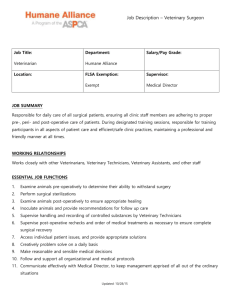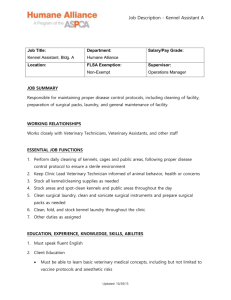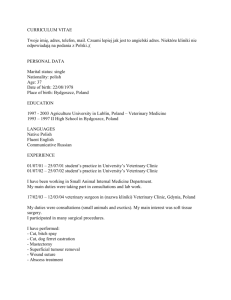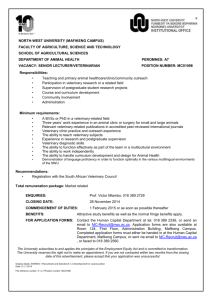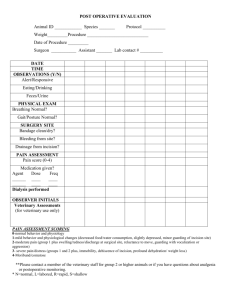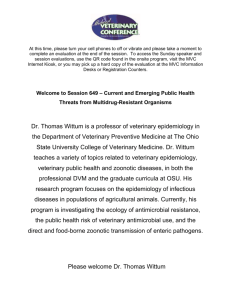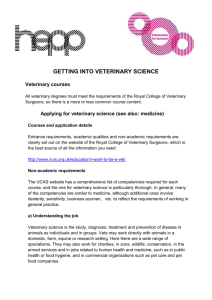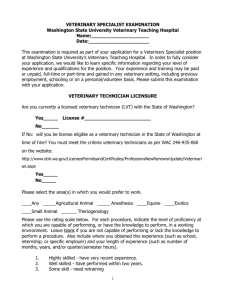Job Description - Veterinary Assistant Job Title: Veterinary Assistant
advertisement
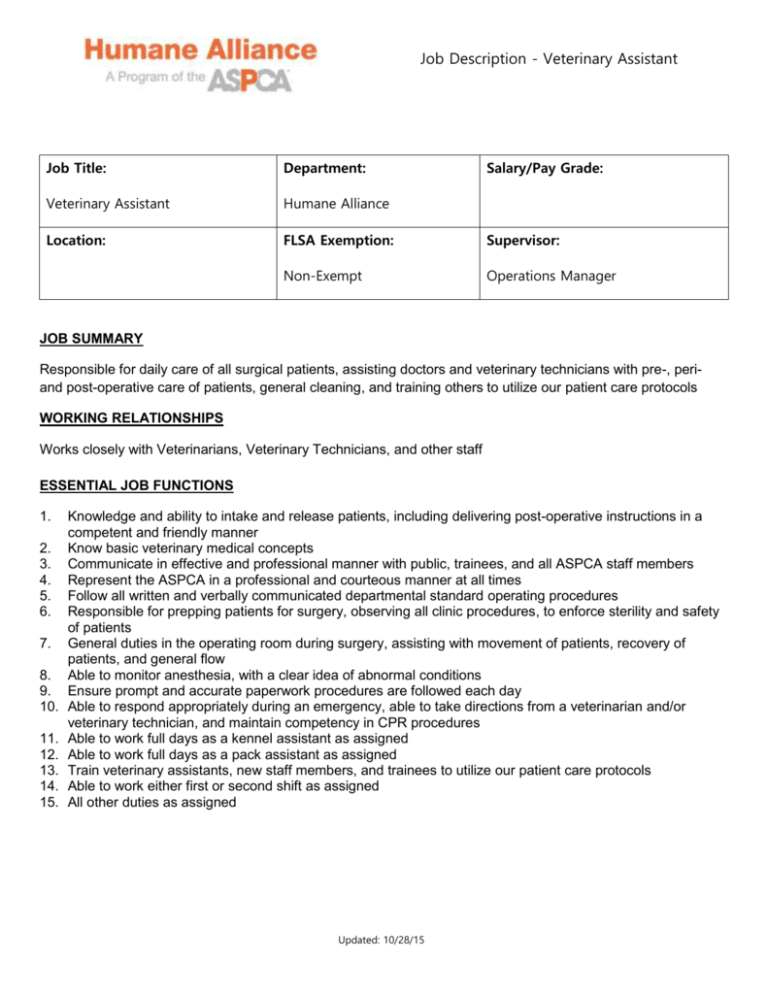
Job Description - Veterinary Assistant Job Title: Department: Salary/Pay Grade: Veterinary Assistant Humane Alliance Location: FLSA Exemption: Supervisor: Non-Exempt Operations Manager JOB SUMMARY Responsible for daily care of all surgical patients, assisting doctors and veterinary technicians with pre-, periand post-operative care of patients, general cleaning, and training others to utilize our patient care protocols WORKING RELATIONSHIPS Works closely with Veterinarians, Veterinary Technicians, and other staff ESSENTIAL JOB FUNCTIONS 1. 2. 3. 4. 5. 6. 7. 8. 9. 10. 11. 12. 13. 14. 15. Knowledge and ability to intake and release patients, including delivering post-operative instructions in a competent and friendly manner Know basic veterinary medical concepts Communicate in effective and professional manner with public, trainees, and all ASPCA staff members Represent the ASPCA in a professional and courteous manner at all times Follow all written and verbally communicated departmental standard operating procedures Responsible for prepping patients for surgery, observing all clinic procedures, to enforce sterility and safety of patients General duties in the operating room during surgery, assisting with movement of patients, recovery of patients, and general flow Able to monitor anesthesia, with a clear idea of abnormal conditions Ensure prompt and accurate paperwork procedures are followed each day Able to respond appropriately during an emergency, able to take directions from a veterinarian and/or veterinary technician, and maintain competency in CPR procedures Able to work full days as a kennel assistant as assigned Able to work full days as a pack assistant as assigned Train veterinary assistants, new staff members, and trainees to utilize our patient care protocols Able to work either first or second shift as assigned All other duties as assigned Updated: 10/28/15 Job Description - Veterinary Assistant EDUCATION, EXPERIENCE, KNOWLEDGE, SKILLS, ABILITIES 1. Must have a high school diploma 2. Must speak fluent English 3. Client Education Must be able to learn basic veterinary medical concepts, including but not limited to vaccine protocols and anesthetic risks Must also be able to communicate basic veterinary concepts to owners and be able to repeat information relayed by a veterinarian Will be asked to take medical histories for surgical rechecks Will be asked to communicate with the public on a daily basis in a professional manner 4. Animal Handling Will be asked to handle (on average) 120 dogs and cats per day Must be able to learn characteristics of animal behavior (for example: be able to identify aggressive or fearful behavior) Must be able to use appropriate safety equipment for fractious or feral animals (will train) – the use of safety equipment is mandatory Must possess excellent reflexes Should be able to identify own limitations and be willing to ask for help Must become proficient at animal restraint for various procedures 5. Physical Requirements Must be able to work standing or sitting for 8 or more hours Must be able to lift and carry up to 50 pounds repeatedly throughout the day with help Must be able to bend and kneel repeatedly Must be able to see fine detail in a variety of situations Must have good hearing including ability to distinguish changes in pitch Must have reasonable degree of agility to move through tightly cramped areas in various situations Must have acceptable sense of touch and smell Must have good range of motion in joints especially wrist, knees, elbows Must have good range of motion in your back for twisting etc. Must be able to work in potentially extreme environmental temperatures Must have acceptable sense of balance Must be able to work and reach on hands and knees Must be able to use a ladder and/or step stool Must possess excellent hand-eye coordination May be asked to move large oxygen tanks Must possess an acceptable degree of dexterity in hands and fingers Must have good vision, including peripheral vision, fine detail, distance, depth perception, and ability to focus 4. Emotional/Mental Requirements Must be able to work under stressful conditions and work efficiently and effectively under those conditions Must be able to respond quickly to a variety of medical situations (with training) Updated: 10/28/15 Job Description - Veterinary Assistant Must be able to cope with death either due to surgical complication or euthanasia Ability to rapidly and accurately process information Ability to delegate tasks Ability to recognize a need for assistance and ask for help Ability to work independently and as part of team Ability to make decisions Ability to cope with frustrating situations and remain calm 5. Potential and Prolonged Exposures Prolonged exposure to various aqueous solutions, including but not limited to, dish soap, chlorhexidine, and spectra soap Prolonged exposure to isopropanol, hydrogen peroxide Potential exposure to formalin solution Potential/prolonged exposure to isoflurane gas Prolonged exposure to quaternary ammonium cleaners and bleach Prolonged exposure to pressurized steam Potential exposure to sharps including needles and surgical blades PREFERRED Two or more years of experience in a veterinary clinic, veterinary hospital, and/or animal shelter or control facility. Candidate should be highly motivated, enthusiastic self-starter with a professional attitude. WORK ENVIRONMENT The offices and operations of a high volume spay/neuter clinic can be high stress and very busy at times. This position is scheduled for 5 days/week, usually Monday through Friday; however, the schedule can change and may sometimes require weekend or evening hours to complete the job. Can include working some holidays or overtime depending on clinic needs. Candidate must be flexible with schedule changes and short notice overtime requests. Acknowledgements & Approval Employee Signature:_________________________________________ Date:__________________ Supervisor Signature:_________________________________________ Date:__________________ Updated: 10/28/15


